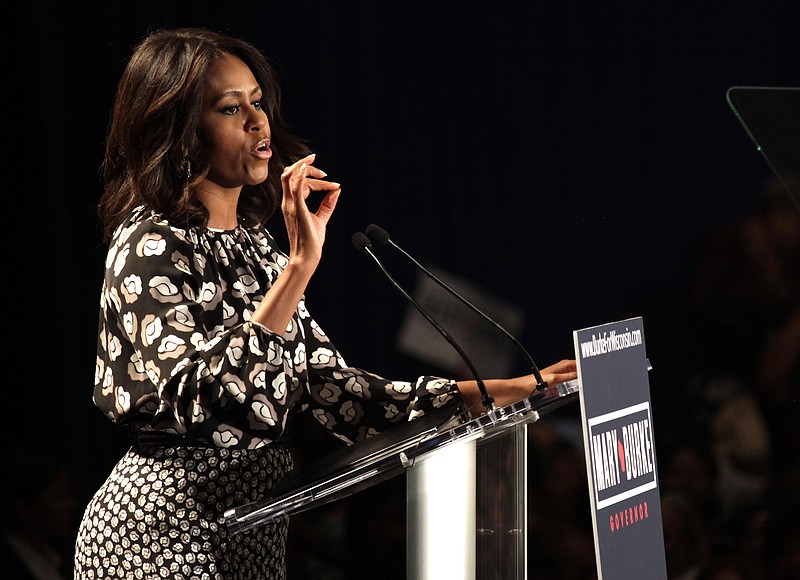The political left, as incredible as it may seem with midterm elections less than six months away, still has not learned the lessons of the 2016 presidential contest.
No, we're not talking about the ascendancy of Donald Trump, a man with many faults, a boisterous bloviator, an inelegant narcissist and a governing neophyte.
The president, after all, is only the symbol of what the 2016 election stood for. But when most Americans went looking for someone to be the antidote to what the previous eight to 10 years had meant to them, he was the one who'd never been elected to public office, the one who seemed willing to say things that needed saying, the one who would stand up to the arrogant national media.
Trump won't be on the ballot this fall, but we believe many voters still feel that what caused them to stray so far from a traditional candidate two years ago has not been eradicated.
Sure, the economy's doing mighty fine, unemployment is low, taxes have been cut, regulations have been rolled back, and the U.S. has withdrawn from the unwise Paris climate accords and Iran nuclear deal.
But 2016 presidential runner-up Hillary Clinton still hasn't gone quietly into a corner to lick the wounds of her upset loss. And Barack and Michelle Obama haven't followed the protocol of former presidents and settled into a quiet retirement.
Why just the other day, there was Michelle Obama - who the week before had referred to herself as America's "forever first lady" - criticizing women for voting for Trump.
"In light of this last election," she said during the United State of Women summit in Los Angeles, "I'm concerned about us, as women, and what we think about ourselves and about each other. What is going on in our heads where we let that [election] happen."
Clinton had made similar remarks and still other excuses and spread the blame for her loss even wider.
And then there was former Obama Secretary of State John Kerry, who it was learned was working against Trump in an effort to save the Iran deal.
Meanwhile, average Americans hear about the widespread campus intolerance of the educated left, are lectured about what they have to accept by the cultural left and are told they are racist, bigoted xenophobes by the activist left.
Is it any wonder they just roll their eyes when they hear the name "Stormy Daniels," turn off the television when someone says "Russian probe" and cancel their newspaper when a headline reads "Trump woes"?
We're still not through primary season, but Democrats aren't mentioning that "blue wave" like they were a month or two ago. They, above all, should know the party out of office always has unrealistically high poll numbers months before an election and that, no matter what party is in power, Democrats usually are favored in generic congressional votes and in Democrat/Republican preference this far out.
Of course, if they can make the general public believe that's the way the country is leaning, the national media will be glad to assist them.
But we believe the 2016 Trump voters are still with him. Salena Zito and Brad Todd, in their new book "The Great Revolt: Inside the Populist Coalition Reshaping American Politics," indicate former Pennsylvania Democrat union official Ed Harry may be typical.
"What I liked about Trump," he said in a book excerpt recently printed by the Washington Examiner, "was that it was more than about Trump, it was about people, it was about being part of something bigger than just me. I felt as though I was part of something important and worthy of accomplishing something better than what we have had."
Renee Dibble of Ashtabula, Ohio, a longtime Democrat with close black, biracial, half-Japanese, half-Mexican and half-Puerto Rican relatives, had a similar story.
"It's not that I think he's perfect, but we didn't want perfect," she said. "The reason, I think," she added later, "and my husband will tell you the same darn thing too, it's because he tells it like it is."
And there's former Obama voter Dave Rubbico of Erie, Pa.
"Look," he said, "this isn't that complicated, in fact it is pretty simple. I wanted Barack Obama to succeed. He ended up hurting us. He was weak. Donald Trump? Well, we finally have someone who has the [wherewithal] to say what needs to be said and then goes out and does what he says."
We are living in an unconventionally partisan political day, and Donald Trump is an unconventional president. What we wouldn't accept in our political yesterdays we now accept, and what we used to accept we now do not.
The ability to take the political temperature of America, with reams of data, with modern analytics, and with 24-hour news coverage from the far right to the far left, was never more in error than it was in 2016.
Those who predict today what is bound to happen in November do so at great peril, because we believe the lessons of 2016 are still being learned.
